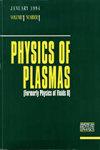On the importance of separators as sites of 3D magnetic reconnection
IF 2.2
3区 物理与天体物理
Q3 PHYSICS, FLUIDS & PLASMAS
引用次数: 0
Abstract
For 3D magnetic reconnection to occur there must exist a volume within which the electric field component parallel to the magnetic field is non-zero. In numerical experiments, locations of non-zero parallel electric field indicate sites of 3D magnetic reconnection. If these experiments contain all types of topological feature (null points, separatrix surfaces, spines and separators), then comparing topological features with the reconnection sites reveals that all the reconnection sites are threaded by separators with the local maxima/minima of the integrated parallel electric along fieldlines coinciding with these separators. However, not all separators thread a reconnection site. Furthermore, there are different types of separator. Cluster separators are short arising within an individual weak magnetic field region and have little parallel electric field along them so are not associated with much reconnection. Intercluster separators connect a positive null point lying in one weak-field region to a negative null point that lies in a different weak-field region. Intercluster separators often thread enhanced regions of parallel electric field and are long. Since separators form the boundary between four globally significant topologically distinct domains, they are important sites of reconnection, which can result in the global restructuring of the magnetic field. By considering kinematic bifurcation models in which separators form, it is possible to understand the formation of cluster and intercluster separators and explain their key properties.分离器作为三维磁重联场所的重要性
要发生三维磁重联,必须存在一个与磁场平行的电场分量不为零的空间。在数值实验中,平行电场不为零的位置表示三维磁重联的位置。如果这些实验包含所有类型的拓扑特征(空点、分离矩阵面、棘和分离器),那么将拓扑特征与重连接点进行比较就会发现,所有重连接点都被分离器穿透,沿磁场线的集成平行电场的局部最大值/最小值与这些分离器重合。然而,并不是所有的分离器都能穿出一个再连接点。此外,还有不同类型的分离器。星团分离器是在单个弱磁场区域内产生的短分离器,沿其产生的平行电场很少,因此与重连接关系不大。簇间分离器将位于一个弱磁场区域的正空点与位于另一个弱磁场区域的负空点连接起来。星团间分离器通常穿过平行电场增强的区域,而且很长。由于分离器构成了四个在拓扑学上截然不同的全局性重要域之间的边界,因此它们是重联的重要场所,可导致磁场的全局性重组。通过考虑分离器形成的运动学分岔模型,可以理解星团和星团间分离器的形成,并解释它们的关键特性。
本文章由计算机程序翻译,如有差异,请以英文原文为准。
求助全文
约1分钟内获得全文
求助全文
来源期刊

Physics of Plasmas
物理-物理:流体与等离子体
CiteScore
4.10
自引率
22.70%
发文量
653
审稿时长
2.5 months
期刊介绍:
Physics of Plasmas (PoP), published by AIP Publishing in cooperation with the APS Division of Plasma Physics, is committed to the publication of original research in all areas of experimental and theoretical plasma physics. PoP publishes comprehensive and in-depth review manuscripts covering important areas of study and Special Topics highlighting new and cutting-edge developments in plasma physics. Every year a special issue publishes the invited and review papers from the most recent meeting of the APS Division of Plasma Physics. PoP covers a broad range of important research in this dynamic field, including:
-Basic plasma phenomena, waves, instabilities
-Nonlinear phenomena, turbulence, transport
-Magnetically confined plasmas, heating, confinement
-Inertially confined plasmas, high-energy density plasma science, warm dense matter
-Ionospheric, solar-system, and astrophysical plasmas
-Lasers, particle beams, accelerators, radiation generation
-Radiation emission, absorption, and transport
-Low-temperature plasmas, plasma applications, plasma sources, sheaths
-Dusty plasmas
 求助内容:
求助内容: 应助结果提醒方式:
应助结果提醒方式:


